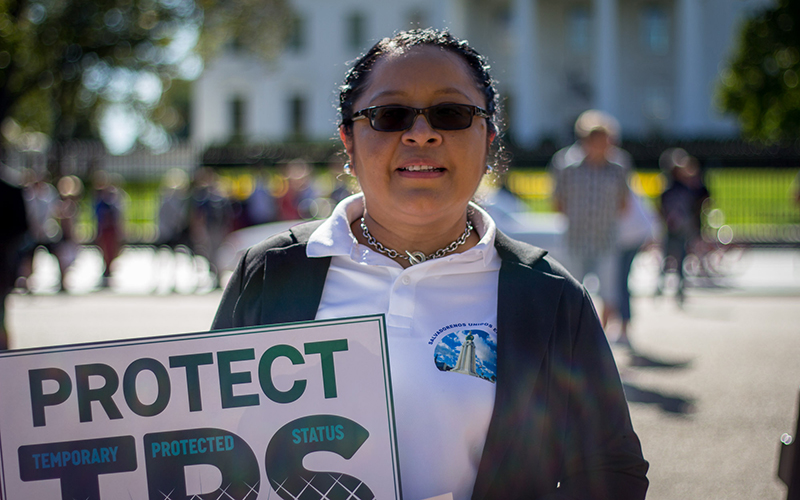
Immigrants with temporary protected status lobbied outside the White House last month for an extension of the TPS program, but the Department of Homeland Security announced late Monday that it would not renew Nicaragua’s TPS designation . (Photo by Adrienne St. Clair/Cronkite News)

Arizona resident Yesenia Chavarria, is one of 1,000 TPS-holding immigrants in Arizona from El Salvador. U.S. Citizenship and Immigration Services says that most of the more than 440,000 TPS holders in this country are from El Salvador. (Photo by Adrienne St. Clair/Cronkite News)
WASHINGTON – Arizona immigrants with Temporary Protected Status who were looking to the Department of Homeland Security for clues to their future in the U.S. may have been left with more questions than answers after an announcement Monday.
Acting DHS Secretary Elaine Duke said late Monday that the department would end protective status for about 5,306 Nicaraguans in the U.S., but she declined to make a determination on the nearly 86,031 Hondurans here. That automatically extended Hondurans’ protected status through July.
There are currently 436,869 immigrants – including about 1,100 in Arizona – from 10 countries that have been given TPS designation, according to the U.S. Citizenship and Immigration Services.
The designation has to be renewed every six to 18 months, and immigrants protected under the program had been looking to Monday’s renewal decisions on Nicaragua and Honduras to see how the Trump administration might be leaning on the program as a whole.
It was “like torture” waiting on the decision all day Monday, said Belinda Osario, a housekeeper at Walt Disney World Orlando, who was on a conference call Tuesday with immigration advocates to talk about the decision.
Royce Murray, policy director for the American Immigration Council, said on the call that not making a decision to extend or terminate the TPS of a country, as Duke did with Honduras, has “never been done before.”
Yesenia Chavarria, a Salvadoran TPS holder who lives in Peoria with a husband and son who are also recipients, said they “are really sad for the Nicaraguan people, but we worry about ourselves, too.”
She said Valley immigrants have started having TPS information meetings, drawing 95 people to one last week. Most of those in attendance were Salvadorans, said Chavarria, who does not personally know any Nicaraguans in Arizona.
Related coverage:
Listen as Temporary Protected Status holders tell their stores in this Cronkite News’ In Focus: DACA Special Report podcast on TPS.
The TPS program was established by Congress in 1990 to protect immigrants already living in the United States from being deported back to countries that were unsafe because of war, environmental disaster or other extenuating circumstance.
Those circumstances are regularly reviewed and DHS has to announce its decision 60 days before a country’s expiration date. If protection is not extended for a given country, immigrants from that country could be forced to go home; if it is extended, those immigrants can stay here but have to apply to have their status renewed through an extensive application process, which includes fees, paperwork and biometric scanning.
That renewal process applies to the automatic extension for Hondurans, who will have to pay $495 each and go through the application process to renew their status until July.
For families like Chavarria’s, renewal means close to $1,500 in fees every time they have to apply.
Despite the regular renewals, some TPS holders have been in the U.S. for as many as 20 years, making them among the most heavily vetted immigrants in the U.S., advocates said.
Osario’s been in the U.S. for 26 years and a TPS holder from Honduras for 19 of them. She called the six-month extension of her protection a “cruel decision” because “every six months it’s going to be the same torture.”
But she is less worried about the cost of applying for renewal and more worried about how much it would cost for her to return to Honduras and rebuild her life.
“Because we’ve been here so long, they think we have the money saved up to go, but we don’t,” she said.
These concerns are faced by other TPS holders, with Haitians awaiting a Thanksgiving Day announcement on their status and Salvadorans expecting an early January announcement. Salvadorans make up the bulk of TPS holders, with 262,528 in the U.S. as of last month.
Salvadorans could take some comfort in the Honduras extension, since both countries have similar problems with violence and extortion and both rely heavily on remittances, or money sent by immigrants back to their home countries from the U.S., to build up their economies.
The situation is different in Nicaragua, which won its designation after a 1998 hurricane, said Oscar Chacon, co-founder of Alianza Americas. Chacon, who was also on the conference call Tuesday, said the concern for Nicaraguans has more to do with how much they are embedded in their communities here.
While Duke said Nicaragua’s TPS status would not be renewed after Jan. 5, she also added a 12-month grace period to allow for an “orderly transition,” giving Nicaraguans here until 2019 to go home or apply to stay in the U.S. through some other program.
Murray said it was significant that Honduras was not terminated immediately. It seems “country conditions do indeed matter more than we thought,” she said.
Elfy Amaya, a TPS holder from El Salvador who lives in Pennsylvania, said that while she and many of her friends with TPS were initially “very sad” after Monday’s announcement, she’s “hoping that it will be good for us” in the end. Amaya noted that both the Honduran and Salvadoran governments have been actively engaged in getting TPS extended, which she said the Nicaraguan president did not do.
Chavarria agreed that Honduras and El Salvador are “in the same situation,” but said she’s still nervous about the looming decision on El Salvador.
“Probably this will be a really sad Christmas for us,” she said.